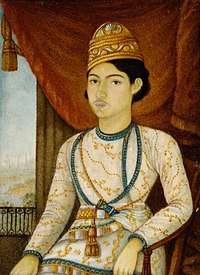Birjis Qadr
| Nawab Birjis Qadr | |
|---|---|
|
Wali (Royal title) King of Awadh | |
 | |
| Reign | 10 May 1857 – 8 July 1859 |
| Predecessor | Wajid Ali Shah |
| Successor | Kingdom Abolished British raj |
| Born |
20 August 1845 Qaisarbagh, Lucknow, Oudh |
| Died |
14 August 1893 (aged 47) Kolkata, British India |
| Dynasty | Awadh |
| Father | Wajid Ali Shah |
| Mother | Begum Hazrat Mahal |
| Religion | Shia Islam |
Berjis Qadr (Hindi: बिरजिस क़द्र 20 August 1845 – 14 August 1893) was the son of Wajid Ali Shah, and was last[1][2] Padshah-e Awadh, Shah-e Zaman
Qadr and some of his subjects fought the British's military presence in India in the Indian Rebellion of 1857.
Timeline
Prince Birjees Qadr sought refuge in Kathmandu, the retributive British Army, which wrested control of Awadh from the king and his mother, Begum Hazrat Mahal. He was migrated during the rule of Jang Bahadur Rana, against precious jewels he managed to retain from extraction by the British. He lived in Kathmandu for eighteen years before moving to Kolkata. Quadr was also a shayar who organized many tarahi mahfil e mushairah in Kathmandu which were recorded by his contemporary Khwaja Naeemudddin Badakhshi. The record of his majlis e mushalirah were discovered by Professor Abdurrauf and Adil Sarwar Nepali in Kathmandu in 1995 and published in the work Nepal mein Urdu Shairi.
| Preceded by Abul Mansoor Meerza Muhammed Wajid Ali Shah |
Padshah-e Awadh, Shah-e Zaman 1857 |
Succeeded by Abolished |
References
- ↑ "Indian Princely States A-J". worldstatesmen.org. Retrieved 19 July 2015.
- ↑ "Indian states before 1947 A-J". rulers.org. Retrieved 19 July 2015.